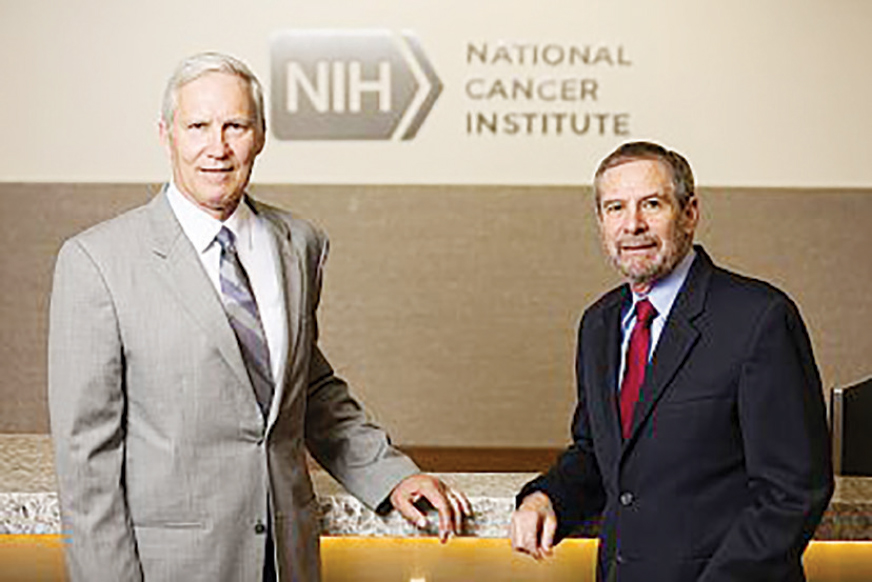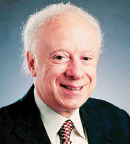
John T. Schiller, PhD (left), and Douglas R. Lowy, MD. Courtesy of the National Cancer Institute.
Two scientists at the National Cancer Institute (NCI) received the 2017 Lasker-DeBakey Clinical Medical Research Award for their significant research leading to the development of human papillomavirus (HPV) vaccines. The award is the country’s most prestigious biomedical research prize and was presented to John T. Schiller, PhD, of NCI’s Center for Cancer Research (CCR), and Douglas R. Lowy, MD, also of the CCR and Acting Director of the NCI.
Dr. Lowy’s and Dr. Schiller’s collaborative work to understand and prevent HPV infection has led to the approval of three preventive HPV vaccines by the U.S. Food and Drug Administration.
“I’m incredibly proud of this much-deserved honor bestowed upon John and Doug for their foundational discoveries that led to the creation of HPV vaccines,” said National Institutes of Health Director Francis S. Collins, MD, PhD. “Thanks to their extraordinary efforts, we have the potential to eliminate cervical cancer and greatly reduce other HPV-associated cancers.”
Public Health Need
Efforts to develop these vaccines were spurred by an urgent public health need. Infection with certain types of HPV causes almost all cases of cervical cancer, the fourth most common cancer in women worldwide. More than 500,000 women around the world are diagnosed with cervical cancer each year, many of them at relatively young ages. More than 275,000 women die of the disease annually, and most of these deaths occur in developing regions of the world. Without successful interventions, the worldwide incidence and mortality from cervical cancer are projected to increase indefinitely. HPV infection can also cause anal, vulvar, vaginal, penile, and oropharyngeal cancers.

Francis S. Collins, MD, PhD
While working to address the need to prevent HPV-caused cancers in the 1990s, a team led by Drs. Schiller and Lowy discovered that the proteins that form the outer shell of HPV could form virus-like particles that closely resemble the original virus—but are not infectious. They found that these virus-like particles could trigger the immune system to produce high levels of protective antibodies, which can neutralize the virus in a subsequent infection. The virus-like particles ultimately became the basis of the three current HPV vaccines: Gardasil, Gardasil 9, and Cervarix.
Drs. Lowy and Schiller say this breakthrough was possible because of earlier discoveries and that it demonstrates the importance of long-term, publicly supported basic research. “People have known since the 19th century that cervical cancer behaved as a sexually transmitted disease, but it wasn’t until the discoveries of Harald zur Hausen and his colleagues that HPV was found to be the cause. Development of the vaccines built upon decades of publicly supported research,” said Dr. Lowy. “We’re honored to be included with the other luminaries who have received this prestigious award.”
Impact of the Vaccine
It is estimated that widespread uptake of current HPV vaccines could reduce the incidence and mortality of cervical cancer by more than two-thirds. Researchers are currently working to find ways to encourage the uptake of the -vaccines by lowering costs and simplifying the logistics of vaccination, especially in the developing world, where most cervical cancers occur.

Joseph L. Goldstein, MD
“This year’s [Lasker Awards] illustrate the power of biomedical investigation to advance human health, whether scientists probe basic questions that reveal unforeseen truths or pursue goal-directed projects,” said Joseph L. Goldstein, MD, Chairman of the Department of Molecular Genetics at The University of Texas Southwestern Medical Center and Chair of the Lasker Medical Research Awards Jury. “Douglas Lowy and John Schiller discovered that a single protein from the capsule of papillomaviruses can self-assemble into virus-like particles, paving the way for HPV vaccines that prevent cervical and other cancers.” ■

